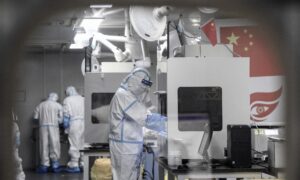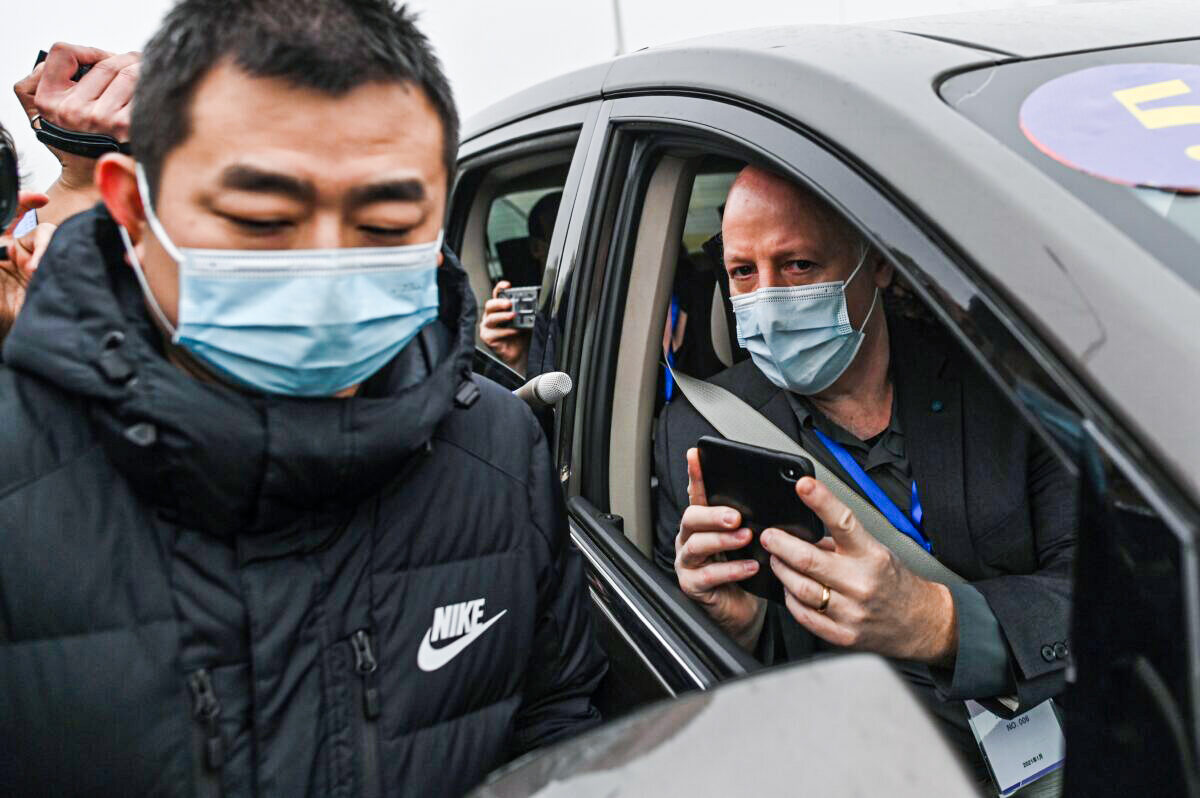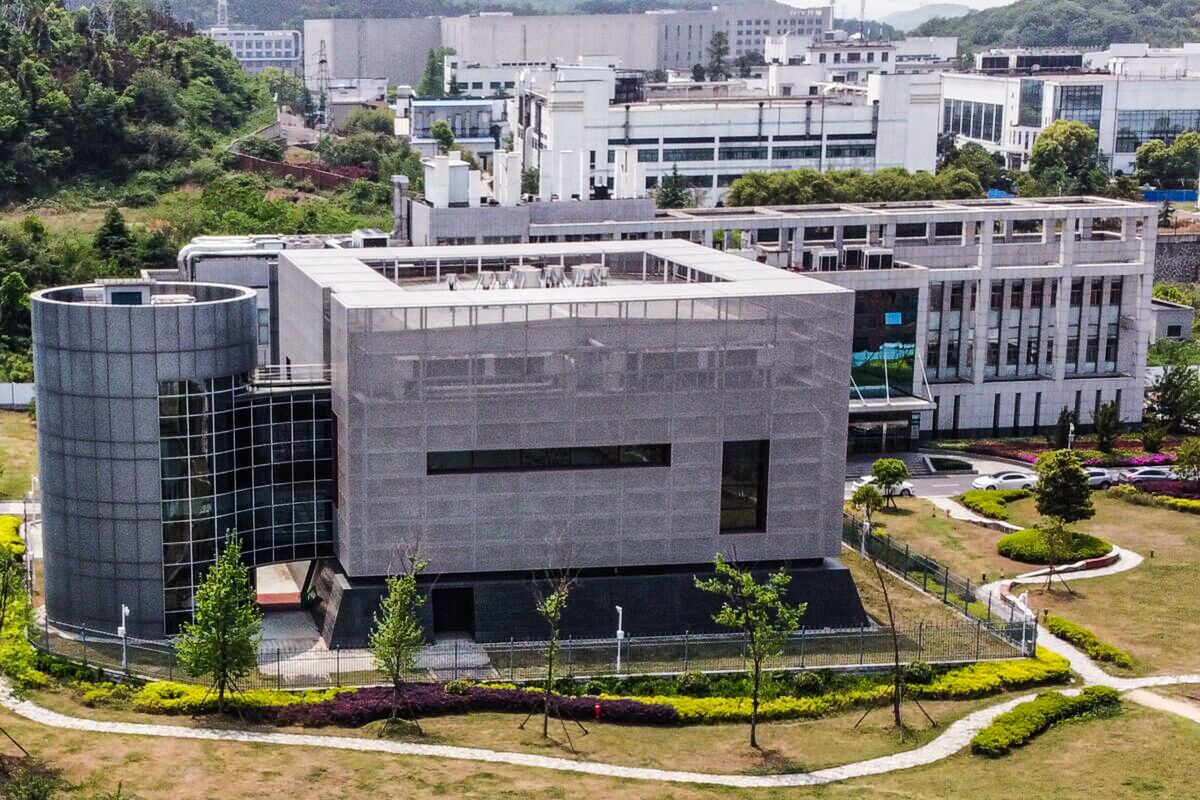HHS Probed EcoHealth Over Alleged ‘Major Fraud’ Against US, Emails Show
The Department of Health and Human Services’ watchdog had briefly probed EcoHealth Alliance, a New York non profit that has collaborated with the Wuhan Institute of Virology, over alleged “major fraud against the United States,” newly released emails show.The four-month-long probe, which opened in September 2020, centered around an allegation that “the COVID 19 virus was generated in the China with the assistance of an NIH [National Institutes of Health] Grant.” The Office of Investigations of the Department of Health and Human Services (HHS) revealed the investigation in an email with the subject line “Grant Information Review [Redacted]” and dated Dec. 3, 2020, according to redacted copies of the documents obtained by the U.S. Right to Know, a public health advocacy group. A tip from an outside source had prompted the office to open the case, a special agent explained in an attached memorandum to Ashley Sanders, an investigative officer at the NIH. Another correspondence issued in January 2021 confirmed that EcoHealth Alliance, which for years worked with a high-level Wuhan lab to conduct risky bat coronavirus research, was one of the targets. The name of the other party was redacted. Such allegations, if true, would constitute a violation of the U.S. federal law, Title 18 of U.S. Code §1031, “major fraud against the United States,” according to the memorandum. Under this law, anyone who tried to “to obtain money or property by means of false or fraudulent pretenses, representations, or promises” in grant, contract, subcontract, or other forms of federal assistance valuing $1 million or more could receive a $1 million fine or up to 10 years in prison, or both. Peter Daszak, right, the president of the EcoHealth Alliance, is seen in Wuhan, China, on Feb. 3, 2021. (Hector Retamal/AFP via Getty Images) The office referred the case to its special investigative branch on Sept. 9, 2020, and agents reviewed the allegation and met with NIH representatives on the same day, the memorandum said. Details of the meeting and a description of the subsequent step taken by the agents on Sept. 29 were redacted. The investigators closed the probe on Jan. 11, 2021. In a letter informing Sanders of the decision, a special agent said they were asked to support efforts “regarding a high-profile situation that involved [redacted] HHS Grantee that had ties to the COVID 19 virus.” The reason for such a move was entirely redacted except for the word “developments,” although the agent noted the agency “reserves the right to reopen the investigation if any new, relevant information is discovered relating to this incident.” The revelation of the existence of the investigation came as NIH, which is overseen by HHS, approved millions in new grants to EcoHealth for studies in Asia into novel viruses that could infect humans and cause an outbreak. The NIH in August terminated funding for EcoHealth’s Chinese partner, the Wuhan Institute of Virology (WIV), citing failed efforts to gain lab entries and other records relating to the facility’s experiments subject of the grant. The P4 laboratory, designated as the highest level of biological safety, at the Wuhan Institute of Virology in Wuhan, China, on April 17, 2020. (AFP via Getty Images/Hector Retamal) To retain the funding for the project, titled “Understanding the Risk of Bat Coronavirus Emergence,” the EcoHealth would have to come up with a proposal excluding the Wuhan lab’s involvement within 30 days, NIH wrote in an August letter to EcoHealth. The NIH had not responded to multiple requests from The Epoch Times to clarify the status of the grant. Under the grant, researchers at WIV conducted experiments that resulted in a more lethal version of a bat coronavirus, a process that some experts said is a form of gain-of-function research—experiments that boost the transmissibility or pathogenicity of a virus. Emails show that the same project had drawn FBI scrutiny months before the HHS began its review of EcoHealth. Sanders, the point of contact during the HHS’s internal investigation later, was set to hold a call with FBI agent David Miller, an email dated May 22, 2020 shows. Last June, the HHS Office of Inspector General announced that it will review NIH-funded programs to ensure grant recipients, including foreign sub-recipients, are complying with federal requirements, a process that could apply to the Wuhan facility. The Epoch Times has reached out to the HHS Office of Inspector General and EcoHealth regarding the investigation. Follow Eva Fu is a New York-based writer for The Epoch Times focusing on U.S. politics, U.S.-China relations, religious freedom, and human rights. Contact Eva at [email protected]

The Department of Health and Human Services’ watchdog had briefly probed EcoHealth Alliance, a New York non profit that has collaborated with the Wuhan Institute of Virology, over alleged “major fraud against the United States,” newly released emails show.
The four-month-long probe, which opened in September 2020, centered around an allegation that “the COVID 19 virus was generated in the China with the assistance of an NIH [National Institutes of Health] Grant.”
The Office of Investigations of the Department of Health and Human Services (HHS) revealed the investigation in an email with the subject line “Grant Information Review [Redacted]” and dated Dec. 3, 2020, according to redacted copies of the documents obtained by the U.S. Right to Know, a public health advocacy group.
A tip from an outside source had prompted the office to open the case, a special agent explained in an attached memorandum to Ashley Sanders, an investigative officer at the NIH. Another correspondence issued in January 2021 confirmed that EcoHealth Alliance, which for years worked with a high-level Wuhan lab to conduct risky bat coronavirus research, was one of the targets. The name of the other party was redacted.
Such allegations, if true, would constitute a violation of the U.S. federal law, Title 18 of U.S. Code §1031, “major fraud against the United States,” according to the memorandum. Under this law, anyone who tried to “to obtain money or property by means of false or fraudulent pretenses, representations, or promises” in grant, contract, subcontract, or other forms of federal assistance valuing $1 million or more could receive a $1 million fine or up to 10 years in prison, or both.

The office referred the case to its special investigative branch on Sept. 9, 2020, and agents reviewed the allegation and met with NIH representatives on the same day, the memorandum said. Details of the meeting and a description of the subsequent step taken by the agents on Sept. 29 were redacted.
The investigators closed the probe on Jan. 11, 2021. In a letter informing Sanders of the decision, a special agent said they were asked to support efforts “regarding a high-profile situation that involved [redacted] HHS Grantee that had ties to the COVID 19 virus.” The reason for such a move was entirely redacted except for the word “developments,” although the agent noted the agency “reserves the right to reopen the investigation if any new, relevant information is discovered relating to this incident.”
The revelation of the existence of the investigation came as NIH, which is overseen by HHS, approved millions in new grants to EcoHealth for studies in Asia into novel viruses that could infect humans and cause an outbreak.
The NIH in August terminated funding for EcoHealth’s Chinese partner, the Wuhan Institute of Virology (WIV), citing failed efforts to gain lab entries and other records relating to the facility’s experiments subject of the grant.

To retain the funding for the project, titled “Understanding the Risk of Bat Coronavirus Emergence,” the EcoHealth would have to come up with a proposal excluding the Wuhan lab’s involvement within 30 days, NIH wrote in an August letter to EcoHealth. The NIH had not responded to multiple requests from The Epoch Times to clarify the status of the grant.
Under the grant, researchers at WIV conducted experiments that resulted in a more lethal version of a bat coronavirus, a process that some experts said is a form of gain-of-function research—experiments that boost the transmissibility or pathogenicity of a virus.
Emails show that the same project had drawn FBI scrutiny months before the HHS began its review of EcoHealth. Sanders, the point of contact during the HHS’s internal investigation later, was set to hold a call with FBI agent David Miller, an email dated May 22, 2020 shows.
Last June, the HHS Office of Inspector General announced that it will review NIH-funded programs to ensure grant recipients, including foreign sub-recipients, are complying with federal requirements, a process that could apply to the Wuhan facility.
The Epoch Times has reached out to the HHS Office of Inspector General and EcoHealth regarding the investigation.












